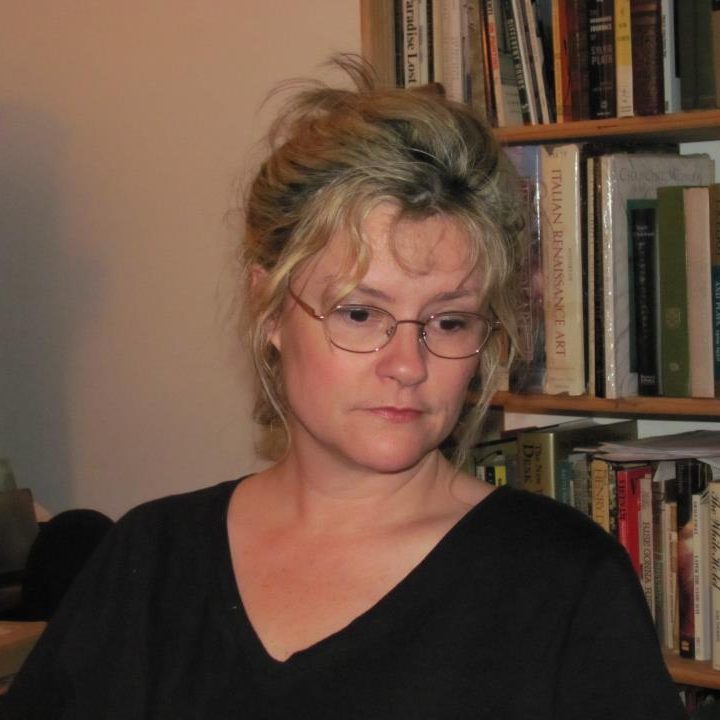“I had the feeling that if language was an obstacle, it was also the place where everything happens, where everything is possible.” ~Nicole Brossard, “Writing as a Trajectory of Desire and Consciousness”
Words have fascinated me my whole life since I sat outside alone and repeated intriguing phrases as a child, discovered ee cummings’ and T.S. Eliot’s poetry as an adolescent and young adult, and learned the power of singing old gospel hymns and sacred rounds as an older adult. For years, I have been a student of language, loving words for their music and textures, words like willow, sassafras, and hyacinth, for instance, and the beauty and breath of luminescence. Words create worlds and destroy them. They are filled with paradox and mystery. They define us and fail us.
“Life and death are in the power of the tongue, and those that love it shall eat the fruit thereof,” reads Proverbs 18:21 (KJV). In sacred stories, God said, “Let there be light,” and there was light. Life was spoken into being. Words create states of mind and madness, states of sickness and health. A love letter changes a life. A school’s letter of acceptance may change a young person’s path forever. In religious ceremonies, words change bread and wine into the body of God, many believe.
Crises of the past few years have caused us to question almost everything. The cusp of an era now confronts us, an era when we may see major institutions break – financial; medical and pharmaceutical; military and industrial; media and technology; modern agriculture; religion and culture. President Dwight D. Eisenhower warned of the “unwarranted influence” of the military – industrial complex in his 1961 farewell address, saying, “The potential for the disastrous rise of misplaced power exists and will persist.”
In addition to the melding of for-profit corporations and the military, we now see destructive powers unleashed when other institutions join. Big Tech, Big Media, and Big Pharma merged to sell us ideas of lockdowns, so we stayed home and consumed their products in the last few years.
Big Finance and Big Government profited. Big Ag collaborates with Big Pharma to sell us food that makes us sick in order to sell us drugs to alleviate sicknesses, caused by poor food. And the military-industrial complex may be involved in making and selling diseases and drugs in addition to making and selling wars and weapons for profit. Institutions work with media and technology companies that control the messaging and the language – the words.
Words have power to destroy, and yet they also redeem us. Words like renaissance and rebirth. “And the Word was made flesh, and dwelt among us,” reads John 1:14 (KJV).
We now endure times of deconstruction that feel unprecedented, crises of confidence in almost all parts of our culture. With institutions crumbling, we may also question the language, the words, that built and sustain these institutions. Many words no longer mean the same or have the same associations — “Left” and “Right; “Liberal” and “Conservative;” “safe” and “free.” Relationships rupture. This rupturing may create openings for new meanings, associations, and alliances.
Words harm and heal. People claim words, then wield them against others to name and shame and shun. Name-calling abounds on all sides, with words such as “anti-vaxxer,” “conspiracy theorist,” “liberal,” and many others. A recent provocative word is “woke,” which members of the media developed. I am not sure what this word means as it is brandished about, but I gather it is an insult, meant to name people that the speaker feels behave in a superior, narrow-minded, or judgmental way. I missed the emergence of this word, “woke,” as it was invented and proliferated on TV, when my family had the TV turned off for many years.
Like other words now, “woke” has been captured; media has taken it hostage and forced it to do its bidding – to name, shame, and divide. Words fail us constantly. And yet we may keep disassembling and reassembling them to not only create divisions — but also to create bridges.
To writing students, I have taught that writing’s primary purpose is to communicate – to form bridges from the thoughts, images, and feelings in my mind to yours. Words are the ordinary tools we all share – they falter and fail, sometimes shine. They are both meek and magnificent.
I regret what has happened to “woke,” as it was made from lovely and admirable origins – in “awake” and “awakening” and in “a wake,” when loved ones gather around a body after a death. I call this word back as I remember my mind growing, awakening, to new ways of thinking in feminist literary criticism classes and history seminars as a graduate student in English when teachers led discussions and assigned readings, guiding students to question and examine histories from different perspectives, including women’s. In literature classes, I remember reading, and then later teaching, Kate Chopin’s The Awakening.
One of my favorite modern American poets, Dorianne Laux, titled her first book, Awake. Theodore Roethke wrote an astonishingly lovely villanelle, “The Waking,” in which he writes, “I wake to sleep and take my waking slow/ I learn my going where I have to go.” James Wright, in his poem, “A Blessing,” certainly describes a kind of transcendent awakening when he writes, “Suddenly I realize/ That if I stepped out of my body I would break/ Into blossom.” William Stafford writes about being awake in another beautiful poem, “A Ritual to Read to Each Other.” He calls for empathy and tenderness towards others, one that stereotyping would certainly negate, when he writes, “If you don’t know the kind of person I am/ and I don’t know the kind of person you are/ a pattern that others made may prevail in the world/ and following the wrong god home we may miss our star.” Stafford ends the poem with these lines: “For it is important for awake people to be awake . . . The darkness around us is deep.”
I want “awakening” and “awake,” along with “awareness” and “aware” restored from the ugly, truncated form, “woke,” that high-salaried TV figures and flashy media outlets created and now snap with contempt. Words and slogans like “woke” or “woke mob” proliferate like advertising ploys, as parts of many forms of propaganda, confusing, dividing, and weakening us. Poetry and other art forms may be antidotes to propaganda.
We may keep asking ourselves – what am I really trying to say? What do I mean? Do I disagree? Is this the right word or phrase for this place, for this occasion? Do I mean “closed-minded” or “narrow-minded?” Do I mean “judgmental,” “hurtful,” or “wrong?” And if wrong, then in what ways? Can I elaborate, explain, give specific examples and images? – or will I use simple, thought-stopping words that keep us bickering and divided, with no bridges in understanding?
Recently, I met Gregory in Venice, Florida, when my husband and I traveled there to visit my father. I learn so much from others’ stories. Gregory and his wife recently moved to Florida from Seattle, Washington, in the middle of the lockdowns, he said, after rioters took over city blocks, and he and his wife worried about increased crime. He added that two of his five sons, both accomplished musicians, stopped being able to make a living as musicians when his sons opposed lockdown measures. The sons left Seattle, lived in RVs in state and national parks with their families for many months and homeschooled their children.
“They were canceled in the music industry when people found out they were conservative,” Gregory said. This seemed to be another time to question words, labels, and language. “Conservative” used to mean staid, traditional, or reserved. Did it mean to conserve resources? I grew up thinking it meant conservative in spending and behavior. People who live in an RV for months and homeschool their children to escape government control do not seem “conservative” but more like hippies of the past, part of countercultural, rebel, or resistance movements. What has happened? Now questioning or rebellion is considered “conservative?”
As institutions break down, categories, terms, and labels also break down, disassemble to make room for new ways of thinking and new alliances.
Growing up, my brothers and I learned the word, “anti-establishment.” We thought “anti-establishmentarianism” was the longest word in English. My college friend had a bumper sticker that read, “Question Authority.”
What has happened? Questioners of the past few years have been called names, stereotyped, shunned, threatened, ostracized, and fired. Questioners have been called “woke” with contempt. “Liberal” used to mean free-thinking and open-minded, dedicated to the ideals of vigorous, clear discourse and freedom of speech. It has also meant generous. Now it is used as an insult. The word, “progressive” has had positive connotations and a long history of meaning forward-thinking, but a friend recently said he withdrew his children from a private school that he said had become too “progressive.” He meant narrow-minded, judgmental, unyielding, and uncharitable.
Words wash away on the wind. As fabulous paradoxes, they can be hard like a stone or a shell and yet scatter like dust. They have physical form in lines and curves, making patterns on a page; they have weight gathered into pages of a book — but they also happen in the air, with the ephemeral quality of music.
“You are protected by the forces of goodness and light,” I told my sons when they were growing up, and even made up a melody for this phrase and sang it to them. I hoped for its substance, prayed for my song to make it so.
In these dark times of confusion and destruction, when meanings fall away from institutions and from words, we may look ahead for new words and new meanings to emerge. To complement words, I have loved long silences of many Quaker Meetings in my faith tradition when we wait for God’s leadings and messages.
With periods of silence and worship, at camps and retreats, the Meeting may extend to the entire day, the night, the weeks, while working or walking; it may continue along the hiking trail or around the fire. The Meeting may be all around us. What new truths will arise from the silence?
Join the conversation:


Published under a Creative Commons Attribution 4.0 International License
For reprints, please set the canonical link back to the original Brownstone Institute Article and Author.









